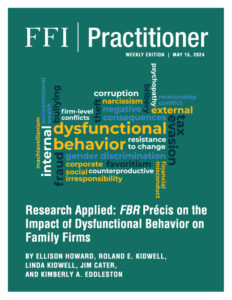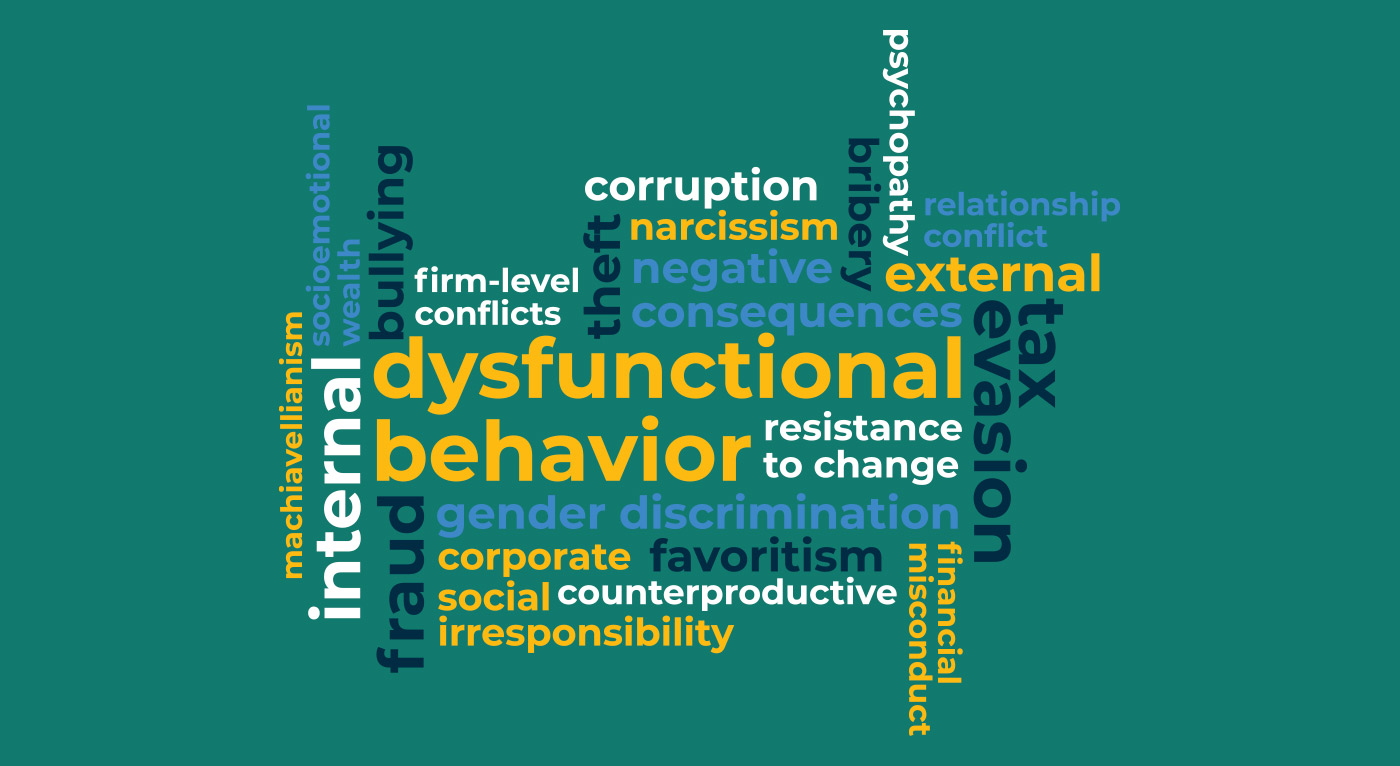
View this edition in our enhanced digital edition format with supporting visual insight and information.
Thank you to this week’s contributors, Ellison Howard, Roland Kidwell, Linda Kidwell, Jim Cater, and Kimberly Eddleston for sharing their précis of “Families and Their Firms Behaving Badly: A Review of Dysfunctional Behavior in Family Businesses” – an article that appears in the March 2024 issue of FBR. In the précis, the authors provide a summary of the research, key findings, and practical implications of the research for families, advisors, and researchers in the field.
Dysfunctional behavior in family firms can result in damaging consequences for the family, the business, employees, and the company’s external environment. For the March 2024 article published in Family Business Review, “Families and Their Firms Behaving Badly: A Review of Dysfunctional Behavior in Family Businesses,” our research team systematically gathered and reviewed 160 published papers related to negative behaviors in family firms. The literature review defines dysfunctional behavior as an act by an employee or group of employees that can result in negative consequences for individuals and/or groups in organizations and the organization itself. As outlined below, the review provides important takeaways for family enterprise owners, consultants, and researchers.
Negative Acts in the Family Business: Types and Causes
Dysfunctional behaviors researched in the articles we examined are described as being either internal (directed toward the firm itself) or external (directed at entities in the firm’s environment), and sometimes open to interpretation:
- Dysfunctional acts directed internally are manifested as counterproductive work behaviors such as resistance to change, acting in secrecy, withholding information, theft of company property or time, bullying and generally impeding the business; bias against non-family employees; gender discrimination usually against female family members, and firm-level conflicts. Such conflicts encompass dysfunctional practices embedded in the firm that transcend one or two individuals, including favoritism, agency issues, and governance disputes. Targets of these behaviors include employees, family members, or the firm itself.
- Negative behaviors directed externally from the firm to its business environment include fraud, financial misconduct, bribery, corruption, tax avoidance/evasion, negative environmental performance, and corporate social irresponsibility. These acts are aimed at competitors, government regulators, and other stakeholders. Most of the externally directed dysfunctional behaviors described in the literature are motived by the accumulation of financial or socioemotional wealth for the firm and the family.
- Some behaviors often termed dysfunctional can be ambiguous. For example, financial misconduct is not always illegal, but potentially unethical; e.g., earnings management/manipulation, or seen as internal mismanagement of firm finances. Similarly, tax avoidance can be regarded as financially responsible depending on the context, yet can potentially develop into tax evasion, an ethical and legal violation. In addition, the ambiguities extend to cultural context. For example, bribery and corruption have been presented as dysfunctional behaviors, but they have also been explored as more ethically and legally ambiguous depending on the national and cultural context in which they take place. In some environments, bribery is simply the “cost of doing business” and necessary for firm survival.
The causes of behaviors considered to be dysfunctional and harmful to the firm have a variety of origins:
- Dysfunction can stem from personality, emotion, relationship conflict, destructive nepotism, and reckless pursuit of socioemotional wealth. Many forms of internal dysfunction flow from interpersonal problems among family members within the firm that likely first developed, or were at least first evident, in early family interactions. Personality types often researched with respect to dysfunctional behaviors include a group of traits known as the dark triad—Machiavellianism, narcissism, and psychopathy. Each of these traits has been linked to dysfunctional behaviors in family firms, including fraud. Other antecedents studied are feelings and attitudes such as entitlement and hubris that lead to perceived injustice when there are disagreements within the firm. These types of feelings and attitudes can spark forms of revenge or attempts to recoup what these individuals feel is owed to them.
- Relationship conflict is one of the most often studied antecedents of dysfunctional behavior within family firms. It is directly and indirectly at the heart of most of the dysfunction in both the family and family firm. In addition to preceding counterproductive work behaviors, relationship conflict may drive dysfunction in necessary firm processes like succession and governance. While nepotism has been discussed as a form of firm-level dysfunction itself, it also often drives other forms of dysfunction. When marginally qualified family members are given preferences in hiring, promotion, and compensation, feelings of resentment and entitlement can lead to perceptions of injustice resulting in counterproductive work behaviors.
- Socioemotional wealth (SEW)—nonfinancial, often intangible value retained by family firms—often motivates dysfunction at the individual and firm levels within family businesses, leading to bifurcation bias1 as well as corporate social irresponsibility. External drivers of dysfunction within family firms include weak institutions, weak legal protection, and institutional corruption. When family firms have to develop and grow within dysfunctional environments, it is difficult for firms to survive without engaging in dysfunctional behaviors. Family firms may be even more vulnerable to corrupt environments than nonfamily firms. The desire for family firms to sustain themselves across generations can make them more likely to engage in whatever activities they deem necessary to survive. These external drivers have been linked to externally directed dysfunctional behaviors in family firms, such as bribery and corruption.
Consequences of Dysfunctional Behavior
Both internal and external dysfunction perpetrated within and by family firms can have negative impacts. Internal dysfunction like counterproductive work behaviors, bifurcation bias, gender discrimination, and firm level conflict may individually and collectively work to impede firm operations like corporate governance and succession planning that ultimately restrict firm performance and productivity. Even though behaviors like fraud, financial misconduct, and tax evasion are directed at external institutions, they can have positive (albeit short-term) impacts on the firm—such as increased profits and perceived productivity—in addition to overall long-term negative effects on the firm and family—including potential legal consequences and adverse firm performance. Both internal and external dysfunction can harm a family firm’s reputation and erode its SEW, especially when those dysfunctional behaviors have visible legal consequences. Further, externally directed dysfunctional behaviors can have negative societal consequences. Fraud, financial misconduct, bribery, and tax evasion can all lead to social deterioration, unfair competition among businesses within the environment, and general business obstacles, even for the firms that engage in the behaviors. Even seemingly less aggressive behaviors like corporate social irresponsibility can ultimately lead to environmental neglect.
Root Causes of Dysfunction Within the Family
The key to avoiding the negative consequences described in the literature may depend on identifying the root causes of family firm dysfunction to defuse potential drivers before they lead to dysfunctional behaviors. As noted, we identified a series of antecedents at the individual and family firm levels that offer opportunities not only for future academic research, but also for practitioners to consider as they cope with dysfunctional behavior in their own family firms and/or the firms they consult or manage. Our review presents a cyclic framework of dysfunction in family firms and adds the consideration of early interactions and family system dysfunction.
On the individual level, parent-child relationships, sibling rivalry, peer influence, and negative imprints (negative attitudes and practices passed through generations) can all predispose an individual to dysfunctional behavior not only within the family but within the firm. Likewise, dysfunction in the family system—like inappropriate parenting styles, poor communication, family disharmony, and unresolved conflict and aggression—can all lead to dysfunction in the family firm. Because the family and the business are so tightly connected, these negative aspects of the families and the individuals within those families are not left at the proverbial front door but infiltrate the firm and define otherwise professional relationships within the firm.
Some Questions to Aid Practitioners and Researchers in Identifying Dysfunctional Behaviors in Family Clients
Dysfunctional behaviors within the family firms can negatively affect both the family and the firm, as well as external stakeholders. And just as issues that developed in the family can negatively impact the firm, issues arising within the firm can negatively impact the family. Because of the cyclical nature of dysfunction within families and their firms, a firm’s dysfunction can influence relationships among family members who work at the firm, and it can also affect the next-generation members who have yet to enter the firm. Thus, for the sake of the health and preservation of the family firm, it’s important for family firm practitioners to recognize and avoid dysfunction that develops within their firms.
The literature review offers several questions for family enterprise practitioners and researchers to explore with their family clients to help identify dysfunctional behaviors as well as their root causes:
- To what extent do habits, behaviors, and interactions among siblings, peers, parents, and other family members impact a family employee’s likelihood to engage in dysfunctional behavior?
- What types and acts of conflict experienced in childhood or adolescence are most likely to promote current and future dysfunctional behavior of family employees?
- What impacts do differences of gender, religion, politics, and ideology within family development have on the likelihood that a family employee will engage in dysfunctional behavior? What effects do these differences have on the family’s response?
- How do close or distant kinship ties influence the relationship (or lack thereof) between nepotism and bifurcation bias across family firms?
- In what ways do cultural and religious norms in the family and in the family firm affect a family firm’s tolerance of dysfunctional behavior?
- What environmental factors influence racial discrimination within family firms, and how does racial discrimination impact the firm as ownership and control are passed to new generations?
Reference
1 Bifurcation bias refers to the asymmetric treatment of family members and non-family members within a family firm.
About the Contributors

Ellison Howard has a PhD in Business Administration from Florida Atlantic University. Her research interests include entrepreneurship, family business, dysfunction within family business, and how gender and race/ethnicity relate to those topics. Prior to entering graduate school, she owned a boutique marketing firm, working with small family businesses. She has published research in Case Studies in Family Business: Overcoming Destructive Conflict, Deviance, and Dysfunction in the Family Firm (Edward Elgar, forthcoming this summer.) She can be reached at ellisonhowar2015@fau.edu.

Roland E. Kidwell, FFI Fellow, PhD, is DeSantis Distinguished Professor of Management and Entrepreneurship in the College of Business at Florida Atlantic University in Boca Raton. His current research focuses on dysfunctional behavior, executive compensation, and human resource management in family businesses. In Fall 2023, he was a Fulbright U.S. Scholar to Belgium, where he worked on family business research at Hasselt University. He can be reached at kidwellr@fau.edu.

Linda Kidwell is an associate professor of accounting and chair of the accounting department at Nova Southeastern University. Her research focuses on ethics, fraud, governmental accounting, and interdisciplinary topics. Her work has appeared in the Journal of Business Ethics, Journal of Emerging Technologies in Accounting, and Journal of Accounting and Public Policy, among other journals. She can be reached at lkidwell@nova.edu.

Jim Cater, FFI Fellow, PhD, is a professor of management and the director of the Center for Family and Small Enterprises in the Soules College of Business at The University of Texas at Tyler, where he has served for the past twelve years. Jim managed his family’s retail furniture business before returning to school for his doctoral studies in Management at Louisiana State University. He can be reached at jcater@uttyler.edu.

Kimberly A. Eddleston, FFI Fellow, PhD, is the Schulze Distinguished Professor of Entrepreneurship and Montoni Research Fellow at the D’Amore-McKim School of Business, Northeastern University. She is also an academic scholar at Cornell University’s Smith Family Business Initiative and founding editor of FamilyBusiness.org. Professor Eddleston’s research focuses on family businesses and the careers of entrepreneurs. She can be reached at k.eddleston@northeastern.edu.

View this edition in our enhanced digital edition format with supporting visual insight and information.





